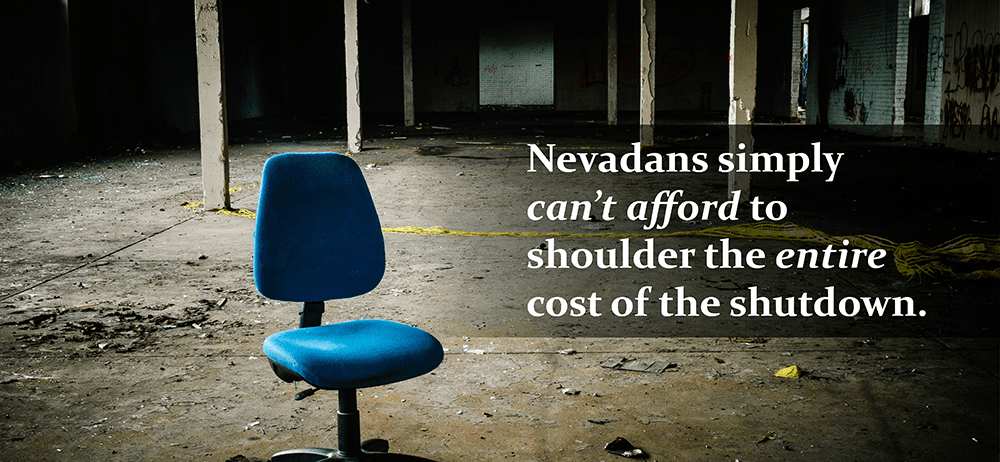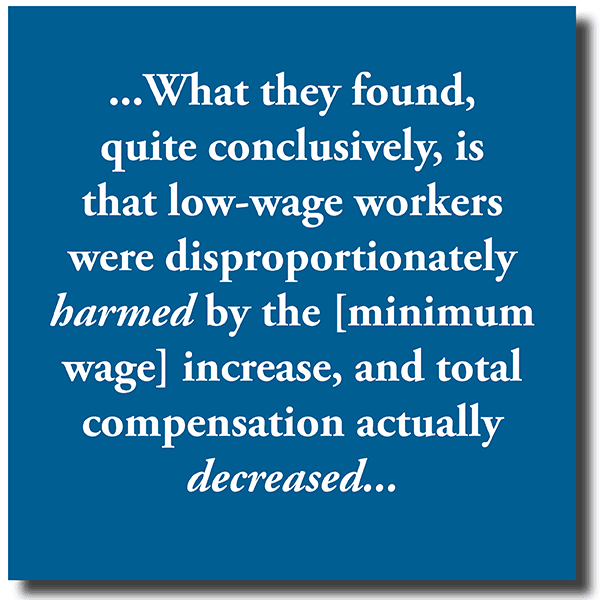Having been shutdown for months, the businesses that have been allowed to open their doors are facing serious economic and social challenges that threaten their very survival.
The following policies, if implemented swiftly, will naturally allow businesses to remain solvent and maintain and/or hire workers in mass numbers, therefore boosting future tax revenues for local government and reducing unemployment in Nevada.
The following policies should be vigorously pursued to allow Nevada businesses the freedom to expand, rebuild and flourish in the wake of the COVID-19 economic crisis.
Click on the below topics to jump to that section:
-
-
No new business taxes
-
The tax burden imposed on Nevada businesses has increased dramatically in recent years.
The 2015 Legislature produced the largest tax increases in state history, totaling nearly $1.4 billion between increased Modified Business Tax rates and a new “commerce” tax on the gross-receipts of businesses, as well as a slew of other provisions.
More recently, the 2019 Legislature extended the scheduled partial sunset of the increased MBT rate, notwithstanding an earlier agreement to decrease the rate as other revenues increased statewide.
Many businesses — especially smaller ones — are simply tapped out. Increasing the tax burdens imposed on commerce will exacerbate and lengthen the economic hardship which businesses are currently suffering.
Nevada has a spending problem, not a revenue problem. Most importantly, Nevada’s businesses shouldn’t be expected to shoulder the entire cost of government’s economic shutdown.
>>Click here to return to the top of the page<<<

-
Temporary freeze on scheduled minimum-wage increases
During the 2019 legislative session, lawmakers passed Assembly Bill 456, which will incrementally raise the minimum wage in Nevada to $12 per hour by 2024 (or $11 per hour for those offered qualifying health benefits by their employer). The first step increase will occur July 1, 2020, when the minimum wage will increase to $9 per hour (or $8 for those w/ qualifying benefits). Thereafter the minimum wage will increase by 75 cents each year, through 2024, until a $12 wage is attained.
 Given the current Corona-induced plight of businesses across the state, however, now is the worst possible time to increase mandated pay rates. Businesses need more flexibility — not less — to guarantee they will be able to hire workers in the numbers needed to promote the long-term solvency of their businesses and the economy. The economy works best when employment is maximized. These scheduled minimum-wage increases should be frozen until such a time when businesses are more suited to adapt to such an increase.
Given the current Corona-induced plight of businesses across the state, however, now is the worst possible time to increase mandated pay rates. Businesses need more flexibility — not less — to guarantee they will be able to hire workers in the numbers needed to promote the long-term solvency of their businesses and the economy. The economy works best when employment is maximized. These scheduled minimum-wage increases should be frozen until such a time when businesses are more suited to adapt to such an increase.
Moreover, research clearly indicates that minimum-wage mandates often backfire: The city of Seattle, for example, in the years 2015-2016 gradually increased its minimum wage from about $9.50 to $13 per hour. Scholars at the University of Washington then sought to quantify the effects of the mandatory wage hike in terms of the labor market and overall employee earnings.
What they found, quite conclusively, is that low-wage workers were disproportionately harmed by the increase, and total compensation actually decreased:
“[We] conclude that the second wage increase to $13 reduced hours worked in low-wage jobs by around 9 percent, while hourly wages in such jobs increased by around 3 percent. Consequently, total payroll fell for such jobs, implying that the minimum wage ordinance lowered low-wage workers earnings by an average of $125 per month in 2016.”
Read the full study by clicking here.
>>>Click here to return to the top of the page<<<
-
Temporary suspension of business licensing fees
Annual requirements for licensing fees which allow businesses to operate legally in Nevada strain businesses’ capacity to endure the COVID-19 crisis and hire more workers going forward.
“The State Business License Fee is $500 for Corporations, and $200 for all other business types. The State Business License must be renewed annually,” according to the Nevada Secretary of State’s official website.
A temporary moratorium on annual licensing fees would encourage growth and economic prosperity until such a time when the economy is back in full swing.
>>>Click here to return to the top of the page<<<
